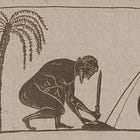
I.
Way back in the day, there was a school of philosophy in ancient Greece known as the Peripatos, founded, so the story goes, by Aristotle.
The name Peripatos comes from the Greek περιπατητικός (peripatētikós)— something like ‘prone to walking’ or ‘wandering’. After all, the members of the Peripatos would do most of their philosophizing while walking through the colonnades of the Lyceum, the Athenian temple dedicated to Apollo.
While I don’t always agree with the habits of ancient philosophers, I think this is a pretty good one. Walking has a host of benefits for mind and body, especially when there are green or blue spaces nearby (and, no kidding, add birdsong for a bonus boost).
Moving your feet seems to be good for moving your thoughts as well. Many people known for their intellectual output integrated walking into their lives. Darwin and Einstein refined their thoughts during daily walks. Virginia Woolf and Henry David Thoreau would piece together their stories on their regular constitutionals. Søren Kierkegaard “walked himself to his best thoughts”, and Kant was so adamant about his daily walks that the people of Königsberg could set their clock to them. And here is a tweet by a more contemporary thinker we’ll meet again a bit later:
And yet, walking without a specific destination, or wandering, is not something most of us make time for. After all, our time has to be spent being ‘productive’. We are caught between producing and consuming, which leaves little time for wandering and contemplation. Everything has to be quantifiable; we have KPIs to meet, dammit!
Yet, to invoke a cliché, not all those who wander are lost. The time spent wandering is not lost either.
II.
Humans are not the only animals that wander. While other types of animal movement, like migration and dispersion, are long-standing topics of study, a recent paper suggests that the importance of animal vagrancy for evolution and ecology has, so far, been overlooked.
In this context, vagrancy means showing up where you’re not supposed to be; or, per the authors:
… the occurrence of individuals outside the normal geographic range of their species.
Animals, in other words, that have wandered beyond their usual territory by accident, driven by climate change, pushed out by humans, or, perhaps, by sheer stubborn wandering.
Such vagrancy is relatively rare, but the biologists point out that, in some cases, it might lead to ecological Black Swan events—statistically improbable events with profound consequences. While we know the Black Swan idea thanks to the book by the earlier mentioned Nassim Nicholas Taleb, it has recently been applied to ecology and evolution.
Instances of animal vagrancy are rare and usually fizzle out inconsequentially, but can some turn into Black Swans? The authors of the first paper certainly seem to think so. While ecological Black Swans are usually ‘downward’ (think population crashes), vagrancy, they illustrate with examples, can lead to the colonization of new territory, the development of new migration routes, or new modes of reproduction.
III.
All this leads me to wonder (and perhaps wander). Has the pendulum swung too much toward ‘time spent productively’ as a yardstick of value? Or are we perhaps misunderstanding productivity wholesale? There are so, so many productivity gurus out there that will sell you their courses or ‘secret’ knowledge on how to work more, pump out more inane content, and create 15-second soundbites to keep the engagement metrics trending in the right direction. What if they’re all wrong? What if productivity and value are not about quantity but quality?
Flipped around, this question becomes: Have we devalued contemplation and creativity too much in favor of relentless production and consumption? Have we forgotten the art of wandering? Of letting our thoughts wander? When was the last time you allowed yourself to daydream? Those daydreams and wandering thoughts are the key to insights — maybe even intellectual Black Swans. Archimedes’ Eureka did not come to him in his workshop but in the bath. Kekulé’s benzene structure arrived in a dream, not in a Pomodoro-driven work sprint. Newton’s apple did not fall in his lab. (I would love more female examples! History is too white and too male as it is. If you know other examples of such serendipitous insights, please drop them in the comments!)
Of course, it’s easy to think about these wandering feet and thoughts until the time comes to pay rent. Then, it’s back to the hustle.
Still, I wonder if those old Greeks weren’t on to something. I wonder what it would be like to wander through the colonnades with no other purpose than to think deeply about whatever thought ‘wanders’ through my mind.
Related thoughts:









Steve Jobs held many one on one meetings while walking, even when his health had declined to the point that it was difficult. I'm a fan of it myself, starting each day with a 5k walk. As for animal vagrancy, where I live it's human-caused. Coyotes and bobcats that have lived here for thousands of years suddenly find themselves surrounded by pesky humans. The saving grace is that our fondness for decorative plants has caused the rabbit population to explode, thus offering a never-ending buffet to the carnivores.
Yes! It's so, so important, for body and mind. I wonder what the biological link is between creativity and walking though.
...
I just found the link, posting what I found in a note!! Really cool stuff 😊